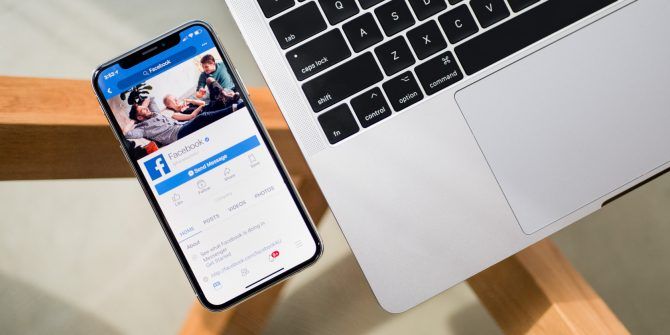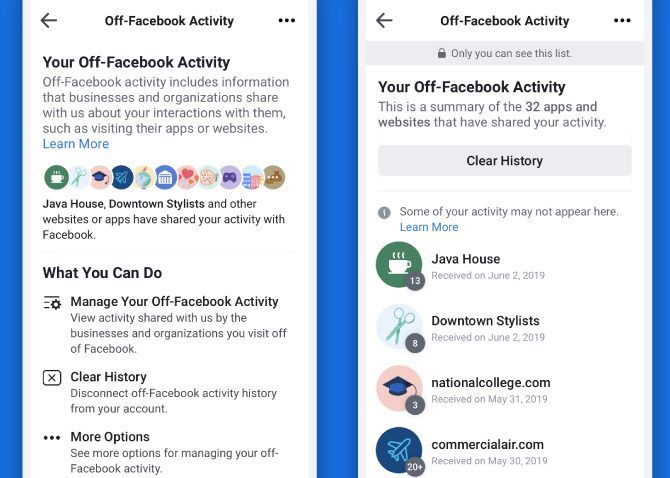Facebook recently released a tool called Off-Facebook Activity. This tool gives you better controls over which apps and services can share your data with Facebook. If you want to stop your data from being spread from third-party services to Facebook, this tool can help.
We’ll show you how to use the tool and what data it will and won’t remove. And fair warning: while the tool is useful, it won’t actually delete your data. So we’ll show you how to remove your data from Facebook as well.
What Is the Off-Facebook Activity Tool?

Facebook has been the subject of significant criticism about its approach to privacy. Now the company is trying to rebuild trust with its users. One way it is doing this is by introducing tools which let users see their own Facebook data
Facebook Is Recording More About You Than You Think: How to See Your Own Data
Facebook Is Recording More About You Than You Think: How to See Your Own Data
There’s no doubt about it: Facebook knows more about you than you do.
Read More
and take more control over this data. The Off-Facebook Activity tool allows use to control what data Facebook receives from other apps and services.
There are two ways that Facebook gathers data about you: firstly, through the information you give Facebook directly. This is information such as your name and the interests which you enter into the Facebook website or app.
The second way Facebook gathers data is through sites that use Facebook functions like the Like button, the option to log in with Facebook, or through an invisible piece of code called a Facebook Pixel. That’s why, after you browse Amazon looking for something like a toaster, your Facebook page is suddenly full of ads for the same toaster.
The Off-Facebook Activity tool gives you more control over this second type of data. It lets you see a summary of the data that Facebook has collected from other apps and websites and disconnect this information from your Facebook account.
How Do You Use the Off-Facebook Activity Tool?

Facebook users in Ireland, South Korea, and Spain will be the first people able to access the tool. It will continue to roll out to users in other countries over the coming months. So if you’re not able to access the tool yet then you can keep checking back.
To use the Off-Facebook Activity tool, start by logging in to the Facebook app on your device. Then go to Settings. Here, in the Your Facebook Information section there should be an option for Off-Facebook Activity. Click this to bring up the tool.
In the Your Off-Facebook Activity section you’ll see information about what the tool does, followed by a list of icons showing the apps and websites which have sent data to Facebook in the past. Beneath this are three options: Manage Your Off-Facebook Activity, Clear History, and More Options.
If you click on Manage Your Off-Facebook Activity you can see a full list of all the apps and websites that have shared your activity with Facebook. In the list you will see an icon, the title of the website, the date at which data from that source was last received, and a number next to the icon showing how many times your activity has been shared.
To clear all this information so it is no longer linked to your Facebook account, click the Clear History button. Next you can also go to the Manage Future Activity section and set the slider for Future Off-Facebook Activity to off to stop Facebook tracking your activities
Facebook Is Tracking You! Here’s How to Stop It
Facebook Is Tracking You! Here’s How to Stop It
Many entities are tracking your internet activity, including social media sites like Facebook. Here’s what you need to know.
Read More
in the future.
What Data the Will the Tool Remove?
The tool anonymizes your browsing data so it is no longer linked to your Facebook account. It should take effect within 48 hours, according to a Facebook engineering blog post. However, an important caveat about this tool is that it will not actually delete your data. It will disconnect the data from your Facebook profile, but it won’t allow you to delete your browsing information.
Facebook still collects information from third party apps and services. But now it assigns a unique ID to each activity report instead of linking it to your name. Facebook continues to harvest data but now keeps it anonymously.
While this is certainly an improvement in terms of privacy, it still means that Facebook has access to vast quantities of data about your internet activities from apps and sites across the web. Even if you don’t have a Facebook account, Facebook can still collect information about you from any site using features like the Facebook Like button or the Facebook Pixel.
How Can You Secure Your Facebook Data?
If you want to remove your data from Facebook, it’s going to take more work. You can start by going to Facebook Ad Preferences. Here you can see the profile Facebook has built of you and your interests based on all the data it has access to. You can also go to Facebook settings and download a copy of the data that Facebook has on you. But be warned: the downloaded file will likely be huge.
Another good tip is to limit how much of your Facebook data is shared with third parties
Facebook Privacy Tip: How to Limit Your Data Being Shared With Third Parties
Facebook Privacy Tip: How to Limit Your Data Being Shared With Third Parties
You should tweak these Facebook privacy settings to prevent your data from unknowingly being shared by friends to third-party harvesters.
Read More
. You can do this by removing Facebook app permissions by going to Settings > Apps > Apps, Websites and Plugins.
It’s also important to prevent your friends from sharing your data by looking in Settings > Apps > Apps others use and going to Edit, then unchecking any items so your friends can’t share them.
The very best way to remove your data from Facebook, however, is to delete your account. If you deactivate your account, it won’t erase your personal data. Deleting your account will remove most but not all of your data. To learn more about what happens when you delete your account, see our guide to what deactivating or deleting Facebook really means for privacy
What Deactivating or Deleting Facebook Really Means for Privacy
What Deactivating or Deleting Facebook Really Means for Privacy
Thinking about quitting Facebook? Here’s how deleting or deactivating Facebook can improve your online privacy.
Read More
.
Take Control of Your Facebook Data
The Off-Facebook activity tool gives you some measure of control over how your data is shared with Facebook. However, it won’t actually delete your data. So if you want to be sure your data isn’t being misused, it’s best to remove it from Facebook altogether.
Controlling the data that Facebook collects about you isn’t only important for your personal privacy and security. It can also have a big effect on society as a whole. To learn more about this important issue, see our article on how your Facebook data is collected and used to win elections
How Your Data on Facebook Is Collected and Used to Win Elections
How Your Data on Facebook Is Collected and Used to Win Elections
What do you do when your Facebook data is harvested and manipulated to influence the course of international politics?
Read More
.